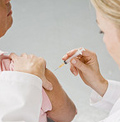 Amid concerns that doctors often feel unprepared to deal with questions about vaccination, and reports that younger health professionals have grown complacent about vaccine-preventable diseases, WHO Europe has published a guide for doctors to support them in discussing vaccination with parents.
Amid concerns that doctors often feel unprepared to deal with questions about vaccination, and reports that younger health professionals have grown complacent about vaccine-preventable diseases, WHO Europe has published a guide for doctors to support them in discussing vaccination with parents.
Professional bodies representing frontline health workers, such as doctors and pharmacists, believe their members should play a central role in reaching immunisation targets, but local vaccinology training courses are also a potential source of real progress.
Take Hungary for example. To coincide with European Immunizaiton Week, the 19th National Vaccination Training Course will take place in the historic town of Eger on April 25-27. Paediatricians, GPs, nurses, midwives and pharmacists will attend to learn about and discuss the latest on vaccine-preventable diseases, vaccine safety and effectiveness, immunology, and vaccination of neonates.
This annual event includes talks from a range of vaccinology experts and also features a workshop on engaging with parents who are unsure about vaccination. This session, will be presented by Dr Zsofia Mészner, Hungarian National Institute of Child Health.
“It is important that doctors and nurses, who deliver vaccines every day, are equipped not just with the technical knowledge they need to do their jobs but also with communication skills required to talk with parents about any concerns they may have,” Dr Mészner told Vaccines Today.
Routine immunisation rates for childhood vaccines in Hungary are good for most vaccines. Childhood vaccination for several diseases, such as polio and measles, is free of charge and mandatory in Hungary, leading to uptake rates in excess of 99%.
Vaccination against pneumoccocal disease is not mandatory but is reimbursed, and vaccine coverage is 90%. On the other hand, vaccination against chickenpox, rotavirus, tick-borne encephalitis and meningococcal disease are recommended but paid for out-of-pocket by those who want – and can afford – to pay. As they are not part of the national schedule, there is no official data on uptake rates.
The Hungarian government also provides free flu vaccination for at risk groups including pregnant women, older people, healthcare workers and those with chronic diseases. The overall vaccination rate is 10-12% but the rate in risk groups is between 20-30%.
Apart from a small outbreak in late 2011, Hungary is on target to meet 2015 measles elimination targets. However, health professionals gathering in Eger will be advised against complacency in light of outbreaks elsewhere in Europe.




